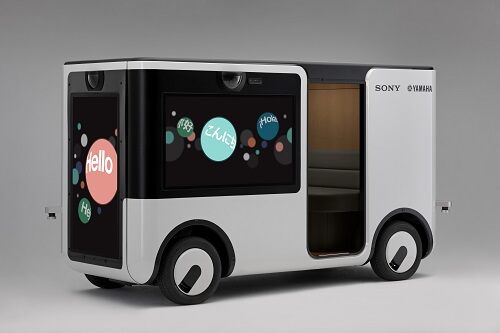Sony announced the partnership with Yamaha Motor for a joint development of the SC-1 Sociable Cart, an autonomous vehicle that delivers a new mobility experience. Sony and Yamaha Motor plan to launch services using this model in Japan in fiscal 2019. The vehicle was developed solely for the purpose of providing a new mobility experience, and it will not be made available for sale.
The SC-1 is designed to transform what was a mere means of mobility into an all-new opportunity for entertainment. Sony and Yamaha Motor will deploy it to provide fun new diversions at venues such as golf courses, amusement parks, and commercial facilities.

(Image: Sony/Yamaha Motor)
Sony developed the vehicle's proof-of-concept prototype in 2016 and completed the SC-1 New Concept Cart prototype in 2017. Then, in 2018, Sony and Kanucha Bay Resort joined forces to use the SC-1 to provide a ride service named Moonlight Cruise, where customers were able to enjoy video and audio entertainment powered by AR projected against the backdrop of night scenes.
The newly announced SC-1 Sociable Cart is a new model of with increased passenger capacity (up from three to five) and extended operation time, as well as a broader front and rear scope of view thanks to additional image sensors.
The SC-1 is featured with image sensors capable of vision beyond that of human capacity on all sides of the vehicle. The self-driving transport vehicle can sense the surrounding environment using images that are in-focus in all directions. Moreover, the high-resolution display installed inside the vehicle together with sensors allows the passengers to see their surroundings at night even without any headlights.
In addition to the image sensors, the SC-1 is also equipped with ultrasonic sensors and a two-dimensional LiDAR system. This makes it possible to accumulate travel data in the cloud for deep learning analysis, which in turn supports optimized driving. This also enables the use of edge computing to process information obtained from the vehicle's sensors to provide safer travel.












